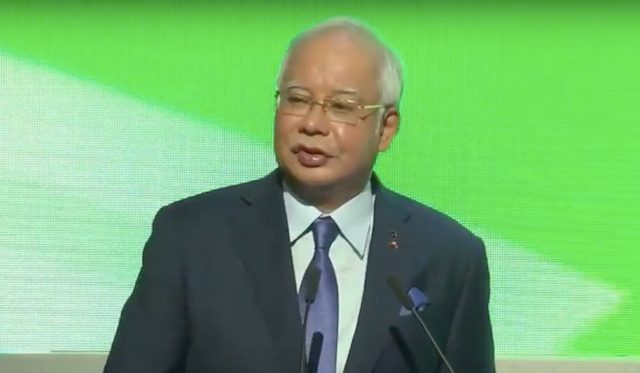SUMMARY
This is AI generated summarization, which may have errors. For context, always refer to the full article.

MANILA, Philippines – Malaysian Prime Minister Najib Razak said bringing prosperity to all sectors has become more important now than ever due to the rise of extremism and populism.
Economic growth that is distributed among its citizens will deter the rise of radicalization, Najib said at the Prosperity for All Summit on Friday, April 28.
“We do not want our citizens to be marginalized. In the age of extremism and radicalization, there is a practical reason for that,” the Malaysian leader said.
“We know that those who see no hope in their own societies are more prone to the siren cals of terrorists who can exploit their vulnerability, and lure them with their lies, giving them a false sense of purpose and achievement,” he added.
Najib said this is a lesson ASEAN can learn from the rest of the world.
“One of the lessons of the rise of extremist populism in Europe too, is that a neglected underclass of those who felt left behind by economic growth, prosperity, and the benefits of globalization, can overturn elections and political systems,” he said.
He said this is also why it is important that economic growth continues in the region.
“Why is it that economic growth and economic size are so important? It is because only if you have a growing economy, then only you can distribute prosperity and wealth. We want this prosperity to be shared by all. Without economic success, there is nothing to be shared,” Najib said.
Since 2009, Najib has been the leader of Malaysia’s ruling coalition, which in nearly 6 decades in power has overseen rapid economic growth, but its policies favor the Malay majority.
Malaysia, like other Southeast Asian countries, has been battling its own war on terrorism, which includes groups like al-Qaeda, Jema’ah Islamiyah and more recently, the Islamic State of Iraq and Syria (ISIS).
What ASEAN can do
The Philippines is hosting the 30th ASEAN Summit. It is Najib’s first visit to the Philippines under President Rodrigo Duterte.
In his keynote address before business and political leaders from the region, Najib outlined the things ASEAN has yet to do to attain equitable and sustainable economic growth.
“We have achieved a critical mass to take us forward, our economies are growing faster than most of the rest of the world and it is expected that by 2050, the ASEAN economy will amount to over $9.2 trillion, making it the 4th largest in the world,” he said.
“These are big numbers, these are impressive positions, but we have yet to achieve them. The big challenge is to ensure the integration of our individual economies – that is necessary for ASEAN itself to become a significant world market – is driven through.”
He added, “We still have a long way to go.”
Among the urgent strategies for ASEAN to meet its goals, he said, is for ASEAN to bring down further trade tariffs. The World Trade Organization said tariffs in the region are at 4%, but Najib said bringing it down to zero or almost zero “must be pursued vigorously.”
He also said trade within the region must be a priority.
“We must work to facilitate intra-ASEAN trade. To achieve $9.2 trillion by 2050, there has to be a 20% reduction in fixed-rate cost,” he said.
“We need to work towards facilitative measures such as national single windows seamlessly linked to the ASEAN single window, and standardized customs procedures,” he added.
Najib also said it is crucial to empower entrepreneurs “particularly in rural and disadvantaged areas” and MSMEs through training and opportunities.
He said enhancing and developing technology, and bringing it to those in the “periphery of economic prosperity,” will make a significant difference in their businesses.
“There is great need to extend e-commerce to ASEAN, particularly to MSMEs, whose sales will benefit immensely from the exponential growth it can offer,” he said.
“We must deploy technology, this powerful force of economic innovation, to help us make the leap to the great future ASEAN promises and ensure it is one of prosperity for all.”
Najib also said it is critical to make ASEAN “real, relevant, and tangible to our citizens.”
“ASEAN must be seen as a source of cohesion, solidarity, support, unity, friendship, strength, and greater prosperity by its people,” he said.
“Bonds between our countries and people must be more evident, to make people feel that’s what our association is about.” – Rappler.com
Add a comment
How does this make you feel?
There are no comments yet. Add your comment to start the conversation.